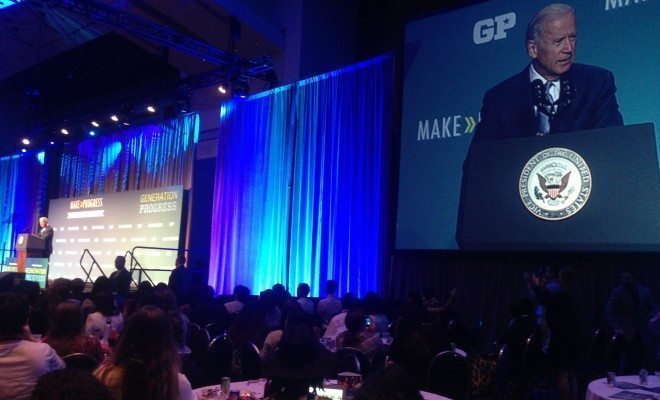 Image courtesy of Emily Dalgo
Image courtesy of Emily Dalgo
Elections
Generation Progress Encourages Millennials to “Make Progress”
How do Millennials help America build a better future? With over 1,200 business-casual-clad young activists and leaders packed into a chilly ballroom washed with blue stage lights, Generation Progress rallied Millennials in Washington, D.C. at its national summit on Thursday in an attempt to find out.
Now in its tenth year, Generation Progress’s “Make Progress” National Summit offers young people a day packed with well known speakers, inspiring dialogues, and stimulating buzzwords. With keynote speakers on the main stage and breakout sessions on topics ranging from diversity in public office to sexual assault prevention and student debt, attendees throughout the day were empowered through education on critical issues. Through communal support and prodigious encouragement from American leaders, the mood was alive with the goal of the day: creating progress.
Massachusetts Senator Elizabeth Warren opened up the summit with an invigorating speech that earned dozens of standing ovations. Reverberating energy, Senator Warren spoke about college affordability, diversity, and social change inspired by activism. During one pause, an audience member yelled out “Run for president!” to which the Senator responded with a big grin and a chuckle, while everyone else jumped to their feet and erupted in approving cheers and applause. Her most applauded statement was that the progressive Supreme Court decisions over the past weeks were the direct result of young activists who dedicate their lives to fighting for social justice, stating, “We get what we fight for. Are you ready to get out there and fight?”
This morning I told young people at #MakeProgress: You get what you fight for. pic.twitter.com/JhwTtTzGBa
— Elizabeth Warren (@SenWarren) July 16, 2015
Michele Jawando, Vice President for Legal Progress at the Center for American Progress, later took the stage for a sobering panel on reforming the criminal justice system. She expressed her belief that young people putting pressure on their elected officials and demanding change is critical, and commended the Millennial generation for its high level of engagement with issues of importance, simultaneously striking down the notion that our generation is unengaged or uninformed.
After asking the audience to “stand up if you have participated in a march, a protest, or an online day of action in the past six months,” more than half of the room was standing. Jawando stated, “the only time Congress pays attention is when there is enough action that forces them to pay attention.” She praised those who partake in activist movements, particularly the sit-ins that forced members of Congress to face the consequences of adverse decisions, and encouraged all to become involved. The discussion then led to a breakdown of the 1994 crime bill that increased mandatory minimums for those sentenced to prison, created the “tough on crime” rhetoric that is only recently beginning to be critically questioned, and created a definition of criminals as young people of color. Jawando said that many current members of Congress were members in 1994 when this draconian bill was passed and that “some of those members don’t really want to concede, they don’t want to admit they were wrong.” She then expressed that while discussing reform is important, action needs to be immediate. “Yeah we are tweeting about it, we’re writing about it, we’re marching in the streets…But we still have to pass a bill y’all.”
Jawando made a few key remarks that resonated deeply with the young, social justice-minded audience; first, that there is a strong connection between the people who are elected and the changes we see in society. Second, that humanizing issues and telling personal stories of injustice is the most powerful way to inspire change. And third, that there is a dangerous misconception that people who are in prison always deserve to be there; Jawando stated that this mindset of “otherization,” or the “us versus them” mentality, will continue to act as a barrier to change until these divisions are broken.
.@MicheleJawando shares her personal experience on discrimination & the criminal justice system #MakeProgress pic.twitter.com/43TsktDXrl
— LCLAA (@LCLAA) July 16, 2015
My favorite breakout panel occurred in the afternoon: “It’s On US: Advocates Creating Cultural Change” featuring keynote speaker Tina Tchen. Tchen, Assistant to President Obama, Chief of Staff to Michelle Obama, and Executive Director of the White House Council on Women and Girls, gave an inspiring and informative speech on Generation Progress’s national campaign to prevent sexual assault. One in five women on college campuses will be sexually assaulted or experience some form of sexual violence by the time they graduate college. “We know, and you know, that this is a crisis on campuses,” Tchen said. The It’s On US movement on college campuses aims to fundamentally change the environment of rape culture and shift the conversation to be empowering for survivors and encouraging for those who have the ability to intervene in situations that could end in assault. “We are fundamentally on our way to a society that recognizes and supports survivors,” Tchen said over snaps and applause. Panelists encouraged students to join or start It’s On US on their respective college campuses, and to take the pledge to end sexual assault.
"It's not just about stopping sexual assault on campus. That is just the start."-Tina Tchen at #MakeProgress @ItsOnUs pic.twitter.com/apyLvEcAlR
— Chante Harris (@chante__harris) July 16, 2015
The final speaker of the day, and the most anticipated, was Vice President Joe Biden. All smartphones were whipped out to welcome the Vice President and most summit-goers found themselves on tiptoe in their chairs to catch a better glimpse of the esteemed guest. Mr. Biden gave a powerful, insightful, but occasionally lighthearted speech, that felt much more like sitting down for an after-dinner conversation with an affectionate grandfather than an address by the Vice President. The VP touched on a range of topics, from the need to create affordable education, to climate change, to closing the expanding wage gap in the country. He even called on politicians to resist donations from millionaires and billionaires to fund their primary election campaigns, potentially an allusion to Senator Bernie Sanders who also cares deeply and advocates against the privatization of political donations.
"If you could do only 1 thing to increase equality what would it be?" @VP asks the #MakeProgress crowd. "Get private money out of politics"
— Generation Progress (@genprogress) July 16, 2015
The Vice President expressed his sincere appreciation and confidence in the Millennial generation, stating “There’s more reason today than ever before to be idealistic, optimistic, tenacious, passionate, and principled.” The most prominent message Mr. Biden delivered during his time on stage was that passion, just like the passion in the room before him, is what generates social change and makes progress.
"I applaud your passion. Never apologize for it. Never explain it away." @JoeBiden at @genprogress #MakeProgress pic.twitter.com/T5cowdiCLT
— Emily Dalgo (@DalgoEmily) July 16, 2015
Generation Progress’s Make Progress National Summit concluded with a slew of selfies with Joe Biden and a ballroom full of young activists stepping back into the D.C. sun with newfound inspiration and admiration for the causes they believe in. The summit, though only one day long, has the power and the potential to ignite young minds for years to come. Make Progress is proof that Millennials do care about the issues. They are engaged, they’re active, and they’re ready to fight. Outside, the only audible sound was of heels clicking and dress shoes clacking on the sidewalks as the attendees trickled out of the summit. But one sound still echoed in everyone minds: applause and cheers for change, for action, and for progress.








Comments